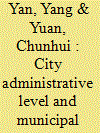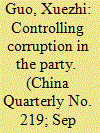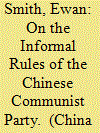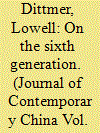| Srl | Item |
| 1 |
ID:
171041


|
|
|
|
|
| Summary/Abstract |
This study focuses on the following important but often overlooked variable in studies investigating China’s cadre system: the city administrative level. Using a dataset covering Chinese municipal party secretaries from 2000 to 2017, this article finds that secretaries from sub-provincial cities are more likely to be promoted than those from prefecture-level cities. This result reveals that serving as a party secretary in sub-provincial cities may be a key step towards further promotion among those who become vice ministers at a young age. In addition, economic performance has a negligible effect on sub-provincial secretaries’ better promotion prospects, highlighting the existence of heterogeneity caused by the city administrative level in the promotion tournament.
|
|
|
|
|
|
|
|
|
|
|
|
|
|
|
|
| 2 |
ID:
141091


|
|
|
|
|
| Summary/Abstract |
This article investigates a prominent but little discussed CCP central organ, the Central Discipline Inspection Commission (CDIC), and its local discipline inspection commissions (DICs) in the post-Mao era. It analyses how the CCP exerts its control over the disciplinary organizations and argues that the disciplinary agencies' lack of autonomy hinders their efforts to crack down on corruption. This article investigates the important role played by the CDIC in CCP politics by examining its organizational structure, modes of operation and criteria for imposing disciplinary sanctions, and evaluates the measures and approaches employed by the Party's disciplinary organizations to combat corruption. The study concludes that structural, institutional and cultural factors hinder the effectiveness of the CCP's disciplinary agencies in their efforts to control Party members, officials and corruption.
|
|
|
|
|
|
|
|
|
|
|
|
|
|
|
|
| 3 |
ID:
181929


|
|
|
|
|
| Summary/Abstract |
The Chinese Communist Party (CCP) is a closely constituted party. Recent studies of the CCP describe and evaluate its formal rules, but to understand the Party as an institution we also need to understand its informal rules. The literature on “party norms”, “institutionalization” and the “unwritten constitution” often fails to distinguish rules from other political phenomena. It confuses informal rules with political practices, constitutional conventions, behavioural equilibria and doctrinal discourse. It is prone to overlook important rules, and to see rules where there are none. Hence, it potentially overstates how institutionalized the CCP is, and therefore how resilient it is. The article provides a clearer account of informal rules and suggests a different explanation for the resilience of the CCP.
|
|
|
|
|
|
|
|
|
|
|
|
|
|
|
|
| 4 |
ID:
171040


|
|
|
|
|
| Summary/Abstract |
Contrary to the current tendency to extrapolate China’s future trajectory from its current retrenchment, it is argued that China has changed substantially in the past and is likely to continue to change in the future. While change has always been strife-torn and radically contingent, it may be seen in retrospect to fit a rough pattern as occasioned by generational as well as ideological and developmental factors. Can we find clues in this pattern of change that provide some basis for speculation about China’s future? A definition of ‘generation,’ is followed by a review of the past pattern of China’s generational evolution and by a theory of generational change to account for it. The essay concludes with a discussion of China’s path-dependent cyclical future evolution.
|
|
|
|
|
|
|
|
|
|
|
|
|
|
|
|